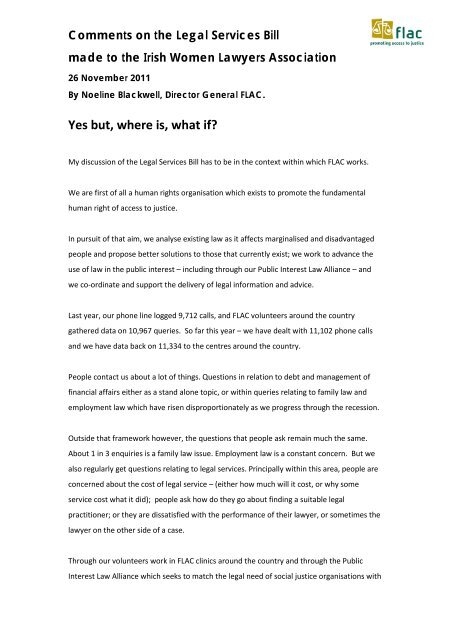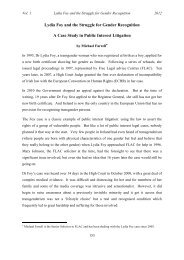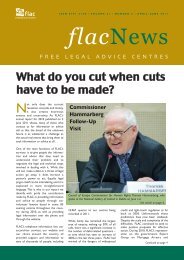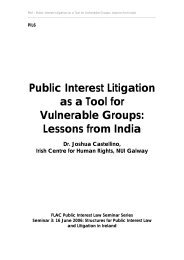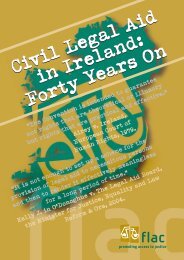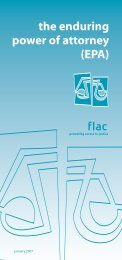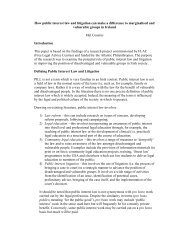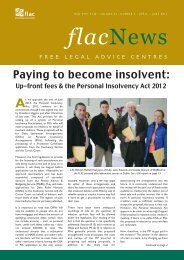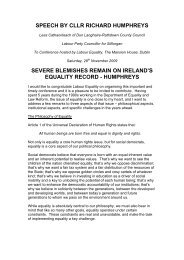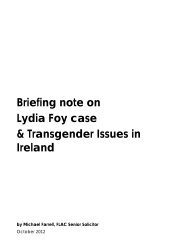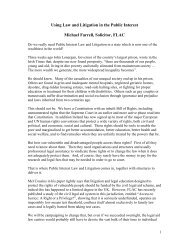Yes but, where is, what if? - FLAC
Yes but, where is, what if? - FLAC
Yes but, where is, what if? - FLAC
- No tags were found...
You also want an ePaper? Increase the reach of your titles
YUMPU automatically turns print PDFs into web optimized ePapers that Google loves.
Comments on the Legal Services Billmade to the Ir<strong>is</strong>h Women Lawyers Association26 November 2011By Noeline Blackwell, Director General <strong>FLAC</strong>.<strong>Yes</strong> <strong>but</strong>, <strong>where</strong> <strong>is</strong>, <strong>what</strong> <strong>if</strong>?My d<strong>is</strong>cussion of the Legal Services Bill has to be in the context within which <strong>FLAC</strong> works.We are first of all a human rights organ<strong>is</strong>ation which ex<strong>is</strong>ts to promote the fundamentalhuman right of access to justice.In pursuit of that aim, we analyse ex<strong>is</strong>ting law as it affects marginal<strong>is</strong>ed and d<strong>is</strong>advantagedpeople and propose better solutions to those that currently ex<strong>is</strong>t; we work to advance theuse of law in the public interest – including through our Public Interest Law Alliance – andwe co-ordinate and support the delivery of legal information and advice.Last year, our phone line logged 9,712 calls, and <strong>FLAC</strong> volunteers around the countrygathered data on 10,967 queries. So far th<strong>is</strong> year – we have dealt with 11,102 phone callsand we have data back on 11,334 to the centres around the country.People contact us about a lot of things. Questions in relation to debt and management offinancial affairs either as a stand alone topic, or within queries relating to family law andemployment law which have r<strong>is</strong>en d<strong>is</strong>proportionately as we progress through the recession.Outside that framework however, the questions that people ask remain much the same.About 1 in 3 enquiries <strong>is</strong> a family law <strong>is</strong>sue. Employment law <strong>is</strong> a constant concern. But wealso regularly get questions relating to legal services. Principally within th<strong>is</strong> area, people areconcerned about the cost of legal service – (either how much will it cost, or why someservice cost <strong>what</strong> it did); people ask how do they go about finding a suitable legalpractitioner; or they are d<strong>is</strong>sat<strong>is</strong>fied with the performance of their lawyer, or sometimes thelawyer on the other side of a case.Through our volunteers work in <strong>FLAC</strong> clinics around the country and through the PublicInterest Law Alliance which seeks to match the legal need of social justice organ<strong>is</strong>ations with
Comments on the Legal Services Bill26 Nov 2011________________________________________________________________________pro-bono legal services, we hear about the excellent work that practitioners do, both inmeeting private legal need and advancing social justice.However and inevitably, in the information and advice service that <strong>FLAC</strong> offers, we tend notto hear from people who received a good service. Rather we hear from people who areeither fearful and at sea when dealing with lawyers or are frustrated with them, ord<strong>is</strong>trustful and d<strong>is</strong>illusioned about them and about the law. For example, in the month ofOctober, we logged 31 phone calls which included the following:“Caller wanted to know <strong>if</strong> a barr<strong>is</strong>ter can ask for payment forservices rendered when case still ongoing;“Caller feels he was way overcharged by solicitor. Also havingtrouble repaying debts;“Caller wanted information about how to get a bill of costs fromh<strong>is</strong> solicitor;“Caller believed solicitors fees extortionate – already complainedto Law Society;“Caller’s former solicitor will not return the files;“Caller was unhappy with rate charged, informed at the beginningthat it would be x amount and charged y;“Caller had engaged solicitor <strong>but</strong> didn’t real<strong>is</strong>e she would have topay;“Caller wanted to know <strong>if</strong> she can challenge her bill of costs fromher solicitor”I believe that many of these calls ar<strong>is</strong>e from a lack of clear communication about the cost orextent of a service rather than an attempt to charge extortionate fees. However, whetherth<strong>is</strong> <strong>is</strong> the case or not, the reality <strong>is</strong> that by the time they contact us, those people areunhappy and d<strong>is</strong>trustful and resentful of the legal profession. It should not be that everymonth, 30 or 40 people contact us, d<strong>is</strong>sat<strong>is</strong>fied with the legal service they receive.The work that <strong>FLAC</strong> does in giving out information and in providing advice and in PILA’s workof setting up pro bono referrals does indeed give a service to people who need it <strong>but</strong> it <strong>is</strong>also part of our broader aim to ensure the fundamental human right of equal access tojustice for everyone. Access to justice <strong>is</strong> a broad phrase. Principally it <strong>is</strong> the right of people tohave equal access to knowledge about their rights and responsibilities, to be aware of and2
Comments on the Legal Services Bill26 Nov 2011________________________________________________________________________have access to relevant d<strong>is</strong>pute resolution procedures and be able to use those processes toachieve a just outcome. Within access to justice therefore, knowledge of and access to thelegal system and to the legal services necessary to achieve a just outcome <strong>is</strong> obviouslycrucial.In addition to the analys<strong>is</strong> provided by the framework of the human right of access tojustice, another framework which <strong>is</strong> helpful in looking at the Legal Services Bill <strong>is</strong> the set ofinternational human rights standards relating to the independence and accountability oflawyers contained in the UN Basic Principles on the Role of Lawyers. Th<strong>is</strong> text did not createnew rights and duties, <strong>but</strong> rather consolidated in one place the main human rights anddemocratic principles which underline the role of legal services in a democratic society. Theprinciples address:- access to lawyers and legal services (1-4)- qual<strong>if</strong>ications and training (9-11)- duties and responsibilities (12-15)- Guarantees for the functioning of lawyers (16-22)- Freedom of expression and association (23)- Professional associations of lawyers (24-25); and- D<strong>is</strong>ciplinary proceedings (26-29)So using the frameworks of the concerns of the people who contact <strong>FLAC</strong> and offundamental human rights, I could perhaps sum up <strong>what</strong> I am about to say in a commentand two questions. They are:- <strong>Yes</strong> <strong>but</strong>;- Where <strong>is</strong>?- What <strong>if</strong>?<strong>Yes</strong> <strong>but</strong>..First I note that an objective of the new Authority proposed in the Legal Services Bill <strong>is</strong> topromote professional principles which are to:- Act with independence and integrity in the best interest of their clients andmaintain proper standards of work- Comply with duties rightfully owed to a court when before the court;- Keep client affairs confidential.3
Comments on the Legal Services Bill26 Nov 2011________________________________________________________________________Th<strong>is</strong> chimes with certain duties and responsibilities of lawyers as set out in the UN BasicPrinciples which require lawyers to maintain the honour and dignity of their profession asessential agents of the admin<strong>is</strong>tration of justice, adv<strong>is</strong>ing and ass<strong>is</strong>ting their clientsappropriately, upholding human rights and fundamental freedoms, acting freely anddiligently in accordance with law and recogn<strong>is</strong>ed standards and ethics of the legal professionand loyally respecting the interests of their clients. Th<strong>is</strong> piece of leg<strong>is</strong>lation may be anopportunity to include the some<strong>what</strong> wider delineation of principles set out in human rightsnorms.The Legal Services Bill 2011 addresses two of the areas that are of fundamental concern tomembers of the public who contact <strong>FLAC</strong> – complaints and legal costs.One of the absolute constants in relation to complaints from the public <strong>is</strong> their suspicion andlack of confidence in the current complaints and d<strong>is</strong>ciplinary system. As people areprincipally dealing with solicitors, the main concerns that we hear in <strong>FLAC</strong> relate to solicitorsalthough some concerns also relate to barr<strong>is</strong>ters employed in the course of a case.In spite of a framework which aims to build independence and accountability within thecomplaints procedure, independent D<strong>is</strong>ciplinary Tribunal and ultimate recourse to the HighCourt, the reality <strong>is</strong> that many members of the public who contact us in <strong>FLAC</strong> genuinely don’ttrust it. They believe that the system <strong>is</strong> run by the Law Society and that as the Law Society <strong>is</strong>the representative body for solicitors, that it cannot be fair to the complainant. I think frommy own experience that it would be fair to say that for exactly the same reason – that itcannot be both representative and a d<strong>is</strong>ciplinary body – many solicitors also have concernsabout the system. It may be that by any objective standards the system <strong>is</strong> entirely fair to allparties and totally independent. However, for as long as it <strong>is</strong> seen as having its roots in theLaw Society – and similarly for as long as the Bar Council <strong>is</strong> seen as the foundation of thebarr<strong>is</strong>ters’ d<strong>is</strong>ciplinary system – then justice will not be seen to be done.Therefore the introduction of a system of regulation including a complaints and d<strong>is</strong>ciplinarysystem which <strong>is</strong> independent of the legal professions will be welcome to people who, afterall, approach the system with a complaint relating to lawyers, the law or the legal system.People will feel that they will get clearer information - for all that people who contact us can4
Comments on the Legal Services Bill26 Nov 2011________________________________________________________________________be frustrated with the situation in which they find themselves, it <strong>is</strong> also quite true that a lotof people who contact <strong>FLAC</strong> don’t want to make a complaint. Instead, they just needinformation as to how the system works. They would like an idea of whether the length oftime that their case <strong>is</strong> taking <strong>is</strong> excessive, or whether a fee <strong>is</strong> likely to be a real<strong>is</strong>tic one.People are likely to trust a system which <strong>is</strong> independent of the legal system more. They willnot feel – as many now do – that the system <strong>is</strong> weighted in favour of the lawyer or that thehearing process must be a biased one. I stress again that th<strong>is</strong> <strong>is</strong> not an objective finding thatthe system <strong>is</strong> unfair. It <strong>is</strong> the perception of many people that I relate. Therefore, as thecurrent system stands, justice <strong>is</strong> not seen to be done.However, in d<strong>is</strong>mantling that system which <strong>is</strong> too often perceived as dependent, thereplacement must not suffer from the same fatal flaw.Under the Bill, the complaints and d<strong>is</strong>ciplinary system will be a substantial part of the workof the new Legal Services Regulatory Authority. The current structure of s.8 of the Bill has aregulatory authority which will be appointed by the Government. Four nominees are tocome from the legal professional bodies (2 from the Law Society, 2 from the Bar Council) <strong>but</strong>are appointed by government and the other 7 are to be appointed by the governmentdirectly. The authority members would have a 4 year term, and would then be eligible forre-appointment – by Government. Members could be removed <strong>if</strong> ‘in the opinion’ ofgovernment, they had a sign<strong>if</strong>icant ‘conflict of interest’ or the member’s removal ‘appearedto be necessary’.I read both Dr. Carol Coulter’s recent analys<strong>is</strong> <strong>where</strong> she concluded that the proposed newsystem lacks independence and Min<strong>is</strong>ter Shatter’s defence in last Monday’s Ir<strong>is</strong>h Times<strong>where</strong> he asserts the many ways in which independence <strong>is</strong> built in to the proposedAuthority. However, that genuine defence will undoubtedly be perceived in much the sameway that those who operate the current system are often perceived as making a special casefor their own system. The proposed new Authority remains rooted in and composed by thegovernment of the day in the same way that the current system remains rooted in theprofessional bodies. The proposed structure therefore will be seen to be to be as tainted bythe perception of bias as that which went before.5
Comments on the Legal Services Bill26 Nov 2011________________________________________________________________________That <strong>is</strong> not just a concern for the court of public opinion, however, it <strong>is</strong> also a problemconcerning genuine access to justice and compliance with general principles of human rightsand fundamental freedoms.In addition to independent and impartial judges and prosecutors, lawyers constitute thethird fundamental pillar for maintaining the rule of law in a democratic society and ensuringthe efficient protection of human rights. The UN’s Basic Principles on the Role of Lawyers,which were adopted by the Eighth United Nations Congress on the Prevention of Crime andthe Treatment of Offenders in 1990 and later accepted by the UN’s General Assembly byconsensus provide as part of the pre-amble that:“... adequate protection of the human rights and fundamental freedoms to which allpersons are entitled, be they economic, social and cultural, or civil and political,requires that all persons have effective access to legal services provided by anindependent legal profession”.Stressing that “the independence of the judiciary and the legal profession <strong>is</strong> essential for asound admin<strong>is</strong>tration of justice and for the maintenance of democracy and the rule of law”,the UN’s Human Rights Committee, the committee of experts overseeing the UN’sInternational Covenant on Civil and Political rights has urged states “to take all appropriatemeasures, including review of the Constitution and the laws, in order to ensure that judgesand lawyers are independent of any political or other external pressure”.With regard to professional d<strong>is</strong>cipline, Principle 26 of the Basic Principlesprovides that:“Codes of professional conduct for lawyers shall be establ<strong>is</strong>hed by the legalprofession through its appropriate organs, or by leg<strong>is</strong>lation, in accordance withnational law and custom and recognized international standards and norms.”Complaints against lawyers “shall be processed expeditiously and fairly under appropriateprocedures”, and lawyers “shall have the right to a fair hearing, includingthe right to be ass<strong>is</strong>ted by a lawyer of their choice” (Principle 27). Furthermore, “d<strong>is</strong>ciplinaryproceedings against lawyers shall be brought before an impartial d<strong>is</strong>ciplinary committeeestabl<strong>is</strong>hed by the legal profession, before an independent statutory authority, or before acourt, and shall be subject to an independent judicial review” (Principle 28).6
Comments on the Legal Services Bill26 Nov 2011________________________________________________________________________As the office of the High Comm<strong>is</strong>sioner for Human Rights has pointed out, it follows fromthese principles that any d<strong>is</strong>ciplinary proceedings against lawyers who are accused of havingfailed to conduct themselves in accordance with the recognized standards and ethics of theirprofession must – amongst other things - be truly independent of the Executive. Anauthority which <strong>is</strong> wholly appointed by government without independent process andwhose members are subject to removal <strong>if</strong> they fail in their duties in the opinion ofgovernment <strong>is</strong> not able to meet these standards.Th<strong>is</strong> particular concern does not take from the need for an independent, transparentprocess to deal with concerns about the legal profession – a profession that <strong>is</strong> crucial toaccess to justice. The structure we should get out of th<strong>is</strong> reform opportunity <strong>is</strong> an authorityand regulatory system which <strong>is</strong> independent of government as well as independent of thelegal profession.The other ‘yes <strong>but</strong>’ comment that I would make <strong>is</strong> in relation to costs. As you will havegathered from the selection of logged calls that I read out at the start, some of those whoneed legal services have little understanding of how much their service will cost. Th<strong>is</strong> Billgives the opportunity to improve the costs regime.Much of <strong>what</strong> <strong>is</strong> proposed seems to be a clearer re-statement of the law together with astronger ins<strong>is</strong>tence on clarity about <strong>what</strong> various costs a client may expect to incur, andwhen. That <strong>is</strong> very welcome. The emphas<strong>is</strong> on communication with clients and some helpfuldescriptions of <strong>what</strong> must be communicated should allow people to understand theiraccounts more clearly. I also note that much of <strong>what</strong> <strong>is</strong> suggested <strong>is</strong> already emerging asgood practice in legal offices and a statutory bas<strong>is</strong> should help standard<strong>is</strong>e good practice.However, th<strong>is</strong> <strong>is</strong> in itself <strong>is</strong> not going to reduce legal bills and the system for assessment oflegal bills still seems to be onerous and complex. Callers to <strong>FLAC</strong>’s phone line or centres arerarely delighted to be told that their remedy <strong>is</strong> to take a bill of costs to the Taxing Master ofthe High Court in order to resolve a d<strong>is</strong>pute. Adding in a proposal that a bill may also be sentto mediation (terms unspec<strong>if</strong>ied) <strong>is</strong> unlikely to give them comfort <strong>but</strong> will rather delay theultimate resolution of the d<strong>is</strong>pute. That system – apart from a change of name – seems to7
Comments on the Legal Services Bill26 Nov 2011________________________________________________________________________remain complex and d<strong>if</strong>ficult. It may be that other proposals to simpl<strong>if</strong>y th<strong>is</strong> process, whilepreserving fairness, could be ident<strong>if</strong>ied in the course of debate on the Bill.It <strong>is</strong> good to see that the Bill provides that the Adjudicator may <strong>is</strong>sue guidelines in relation tocosts from time to time, and also that some dec<strong>is</strong>ions will be publ<strong>is</strong>hed. However, it appearsthat quite a substantial number of bills will be excluded from publication <strong>if</strong> all bills relating toin camera matters, matters settled and solicitor/ client costs are to be kept private.Where <strong>is</strong> .. ?Moving on then to the second comment ‘Where <strong>is</strong> it’, it <strong>is</strong> very d<strong>is</strong>appointing that th<strong>is</strong>substantial opportunity for law reform with the potential to increase access to justice doesnot address some major concerns which deny people access to the legal system, and in thatcontext, denies them access to justice.While today’s seminar <strong>is</strong> to deal with <strong>what</strong> has been publ<strong>is</strong>hed, it seems to me that as theOireachtas debates the Bill, there will be potential to look at <strong>what</strong> <strong>is</strong> not in the Bill, which <strong>is</strong>why I will briefly mention 3 d<strong>if</strong>ferent areas <strong>where</strong> it seems to me that there was anopportunity to do much more. They are:- More access to the legal system for the poorest in our land through civil legal aid;- Reform of delays and inefficiencies in the system; and- Removal of barriers which deny people access to the legal system.The Civil Legal Aid system <strong>is</strong> in serious cr<strong>is</strong><strong>is</strong>.“At th<strong>is</strong> time when an increasing number of people are using the civil legal aid system thereare decreasing resources. For example, the board’s grant-in-aid, which accounts for the vastmajority of its funding, other than in regard to asylum, has been as follows since 2008 -€26,988,000 in 2008; €26,310,000 in 2009; €24,225,000 in 2010; and €24,125,000 in 2011,based on the funding provided in budget 2010...” – not my words, <strong>but</strong> those of Min<strong>is</strong>terShatter in June 2011.At the same time as the budget has been reduced by almost 3 million, the demand for civillegal aid has r<strong>is</strong>en enormously, resulting in a situation <strong>where</strong> in September 2011, almost5,000 people were waiting for a first appointment with a solicitor. In Tallaght, Co. Dublin,8
Comments on the Legal Services Bill26 Nov 2011________________________________________________________________________you could expect that wait to be 11 months, in Tipperary 10, and in Kildare 8 months. Apartfrom all the ex<strong>is</strong>ting constitutional law and European Court of Human Rights jur<strong>is</strong>prudencerelating to right of access to the courts, the UN principles set out that:“Governments shall ensure the prov<strong>is</strong>ion of sufficient funding and other resources for legalservices to the poor and, as necessary, to other d<strong>is</strong>advantaged persons. Professionalassociations of lawyers shall cooperate in the organization and prov<strong>is</strong>ion of services, facilitiesand other resources.”My experience has been that the professional associations have always been committed tothe promotion of a decent and effective civil legal aid scheme. The problem now <strong>is</strong> thatgovernment <strong>is</strong> not ensuring the prov<strong>is</strong>ion of sufficient funding and other resources to a LegalAid Board that, in addition to managing th<strong>is</strong> scheme, has recently been given responsibilityfor the management of a number of other schemes and has not been adequately resourcedto deliver legal services to the poor and other d<strong>is</strong>advantaged persons.I do appreciate that the Min<strong>is</strong>ter <strong>is</strong> committed to bringing forward a mediation bill.However, mediation <strong>is</strong> also resource intensive and needs to be supported by access toadequate legal information and advice. While it may ass<strong>is</strong>t in a better d<strong>is</strong>pute resolution, itmust not be used as a way to deny people access to the legal information, advice andrepresentation that they need to access justice.The delays and inefficiencies of the court systems are not addressed at all in the Bill. Againwhen I look at <strong>what</strong> people are confused and concerned about when they approach <strong>FLAC</strong>,they worry about all the delays, the adjournments, the lack of certainty as to whether a casewill proceed. Th<strong>is</strong> remains the case in spite of substantial advances in case management etc.in recent years. Apart from <strong>what</strong> callers say to us, there are also concerns ra<strong>is</strong>ed about thereduction in court staff which may impact on when courts would open. The cost andavailability of legal services <strong>is</strong> also hampered by these delays and inefficiencies which inturnhampers the admin<strong>is</strong>tration of justice, and people’s access to justice.Finally, in th<strong>is</strong> category of <strong>is</strong>sues m<strong>is</strong>sing from the Bill, it would be really helpful <strong>if</strong>, in thecourse of debate on the bill, some substantial barriers for marginal<strong>is</strong>ed and vulnerablepeople could be addressed. In the experience of <strong>FLAC</strong>, as recently examined by the PublicInterest Law Alliance, the cost of vindicating rights <strong>is</strong> one of the biggest barriers to justice.9
Comments on the Legal Services Bill26 Nov 2011________________________________________________________________________Not only does the applicant incur their own legal fees; they run the r<strong>is</strong>k of incurring those oftheir opponent.For all potential litigants, the r<strong>is</strong>k of exposure to an adverse costs order <strong>is</strong> a criticalconsideration in deciding whether to proceed with litigation. <strong>FLAC</strong>’s colleagues inindependent law centres have confirmed that public interest cases are not being pursuedbecause of the costs exposure for clients. On one view, the public interest applicant shouldbe expected to assume that r<strong>is</strong>k like any other litigant. Yet by its very nature public interestcases often involve applicants who cannot afford such exposure. Should th<strong>is</strong> prevent an<strong>is</strong>sue of public importance and interest from being heard? The Bill provides that costsshould ‘follow the event’ with some limited exceptions. <strong>FLAC</strong> would like to see theseexceptions include prov<strong>is</strong>ion for litigants who take cases which are of substantial publicinterest, and for ensuring that such people are not pun<strong>is</strong>hed by costs and the worry aboutcosts as they seek to vindicate their rights and the rights of others.Another barrier <strong>is</strong> the absence of a multi-party or class action. In its earlier h<strong>is</strong>tory, <strong>FLAC</strong> wasinvolved in multi-party litigation for a number of people on social welfare. Such people arevulnerable not just because of poverty or the r<strong>is</strong>k of costs being awarded against them <strong>but</strong>because they believe that they could be singled out by dec<strong>is</strong>ion makers who have substantialpower over their lives. In the current legal system, even <strong>if</strong> legal fees are not charged byeither side, the cost and delay of bringing a case <strong>is</strong> often not worth it for <strong>what</strong> may be apittance – restoration of a small social welfare benefit or the like. For such people, or forpeople with an action in consumer law, the multi-party or class action can be the just vehiclefor challenging unfairness and abuse of rights. The Law Reform Comm<strong>is</strong>sion has providedrecommendations in th<strong>is</strong> regard already and it would be helpful in advancing access to legalservices and to justice <strong>if</strong> these proposals were to be seriously examined with a view toenacting a scheme to permit such actions.What <strong>if</strong> ..?In th<strong>is</strong> third category, I believe that there <strong>is</strong> a very strong case to be made for deferring forfurther study certain proposals in the Bill which could do substantial harm to the access thatpeople have to the legal services that they need.10
Comments on the Legal Services Bill26 Nov 2011________________________________________________________________________These are the proposals to permit partnerships amongst barr<strong>is</strong>ters and to permit multid<strong>is</strong>ciplinarypartnerships. The current system of legal services, while far from perfect, hassome features which should only be d<strong>is</strong>mantled after thoughtful study and debate. One ofthose features <strong>is</strong> the capacity of people to obtain the skills of any pract<strong>is</strong>ing barr<strong>is</strong>ter forexactly as long as they need those skills, and no longer.The current arrangement <strong>is</strong> achieved by an ad-hoc partnership between a person’s usualpractitioner and any barr<strong>is</strong>ter who <strong>is</strong> a member of the Law Library. It <strong>is</strong> like, <strong>but</strong> evensimpler than, the connection between the GP doctor and the special<strong>is</strong>t. Currently, a personcan work with their general practitioner lawyer and, depending on the problem, can look toa wide range of expert<strong>is</strong>e and knowledge either for an opinion, or for court representation.The user of legal services may only need a property law special<strong>is</strong>t or an expert inadmin<strong>is</strong>tration law once in a l<strong>if</strong>etime. Currently, they access that expert<strong>is</strong>e by hiring thespecial<strong>is</strong>t Property Law or Admin<strong>is</strong>trative Law special<strong>is</strong>t to deal with the prec<strong>is</strong>e <strong>is</strong>sue.Similarly, an independent law centre such as <strong>FLAC</strong>, working mainly with volunteer and probonolegal expert<strong>is</strong>e or a small legal firm working in the suburbs or outside of a big city maybe regularly engaged in <strong>is</strong>sues of human rights or social justice <strong>is</strong>sues <strong>where</strong> admin<strong>is</strong>trativelaw or constitutional or human rights law <strong>is</strong>sues occur or <strong>where</strong> special<strong>is</strong>t advocacy <strong>is</strong>needed. Neither we nor the other law centres, nor indeed small firms can afford to employall of the necessary expert<strong>is</strong>e that we need. We too are able to call on and hire in thespecial<strong>is</strong>t admin<strong>is</strong>trative lawyers that we need from time to time and, depending on theirown capacity – and that only – they are able to work with us. We don’t have to employthem, or worry about them when they are not working on our cases – and equally, theydon’t have to worry about us.Under the new proposal, it <strong>is</strong> at least conceivable and perhaps likely, that special<strong>is</strong>ts wouldbe absorbed into large firms, <strong>where</strong> they would of course be bound by the terms of thatpartnership, which would be a permanent arrangement.From <strong>FLAC</strong>’s point of view, I do not think that such alternative arrangements would depriveus or our sibling law centres of pro-bono expert<strong>is</strong>e. I do not think that <strong>if</strong> lawyers were inpartnership with each other or <strong>if</strong> solicitors and barr<strong>is</strong>ters went into partnership together,that all of the current capacity to access special<strong>is</strong>ts would be lost. I know from the work of11
Comments on the Legal Services Bill26 Nov 2011________________________________________________________________________our Public Interest Law Alliance that there <strong>is</strong> a capacity and willingness to do pro-bono workfor human rights <strong>is</strong>sues in big law firms as well as amongst sole traders. But it <strong>is</strong> at leasthighly arguable that there has to be more structure and less capacity even among willingbarr<strong>is</strong>ters than there <strong>is</strong> now when people have obligations to other partners as well asbarr<strong>is</strong>ters’ current obligations to themselves, their clients and their need to run a soletrader’sbusiness.Whatever about those who can access pro-bono services, such as us and the otherindependent law centres, the real potential for loss <strong>is</strong> for those who need special<strong>is</strong>t servicesoccasionally. So the small firm which just needs to engage a special<strong>is</strong>t company law barr<strong>is</strong>terfor perhaps one or two clients in a l<strong>if</strong>e time – that <strong>is</strong> the kind of capacity that could be lost.That lawyer will have to tell her or h<strong>is</strong> client to go to the large firm <strong>where</strong> the special<strong>is</strong>toperates, which may be a d<strong>is</strong>tance from <strong>where</strong> the person lives - and pay the greater feescharged by that large firm. That reduces the access of the normal consumer of legal servicesand could lead to a situation <strong>where</strong>, more than ever, the people who need legal services getthe services they can afford, rather than those they need in order to access justice./End12
Comments on the Legal Services Bill26 Nov 2011________________________________________________________________________APPENDIXUN Basic Principles on the role of lawyersThe UN Basic Principles on the Role of Lawyers constitutes a compilation of the internationalnorms relating to the key aspects of the role of lawyers and a person’s right to independentcounsel. The Basic Principles were unanimously adopted by the Eighth United NationsCongress on the Prevention of Crime and the Treatment of Offenders in September 1990.Subsequently, the UN General Assembly welcomed the Basic Principles in their ‘Humanrights in the admin<strong>is</strong>tration of justice’ resolution, which was adopted without a vote on 18December 1990 in both the session of the Third Committee and the plenary session of theGeneral Assembly. They are as follows:Preamble:- Whereas in the Charter of the United Nations the peoples of the world affirm, inter alia ,their determination to establ<strong>is</strong>h conditions under which justice can be maintained, andproclaim as one of their purposes the achievement of international cooperation inpromoting and encouraging respect for human rights and fundamental freedomswithout d<strong>is</strong>tinction as to race, sex, language or religion,- Whereas the Universal Declaration of Human Rights enshrines the principles of equalitybefore the law, the presumption of innocence, the right to a fair and public hearing byan independent and impartial tribunal, and all the guarantees necessary for the defenceof everyone charged with a penal offence,- Whereas the International Covenant on Civil and Political Rights proclaims, in addition,the right to be tried without undue delay and the right to a fair and public hearing by acompetent, independent and impartial tribunal establ<strong>is</strong>hed by law,- Whereas the International Covenant on Economic, Social and Cultural Rights recalls theobligation of States under the Charter to promote universal respect for, and observanceof, human rights and freedoms,- Whereas the Body of Principles for the Protection of All Persons under Any Form ofDetention or Impr<strong>is</strong>onment provides that a detained person shall be entitled to have theass<strong>is</strong>tance of, and to communicate and consult with, legal counsel,- Whereas the Standard Minimum Rules for the Treatment of Pr<strong>is</strong>oners recommend, inparticular, that legal ass<strong>is</strong>tance and confidential communication with counsel should beensured to untried pr<strong>is</strong>oners,- Whereas the Safeguards guaranteeing protection of those facing the death penaltyreaffirm the right of everyone suspected or charged with a crime for which capitalpun<strong>is</strong>hment may be imposed to adequate legal ass<strong>is</strong>tance at all stages of theproceedings, in accordance with article 14 of the International Covenant on Civil andPolitical Rights,- Whereas the Declaration of Basic Principles of Justice for Victims of Crime and Abuse ofPower recommends measures to be taken at the international and national levels toimprove access to justice and fair treatment, restitution, compensation and ass<strong>is</strong>tancefor victims of crime,- Whereas adequate protection of the human rights and fundamental freedoms to whichall persons are entitled, be they economic, social and cultural, or civil and political,requires that all persons have effective access to legal services provided by anindependent legal profession,- Whereas professional associations of lawyers have a vital role to play in upholdingprofessional standards and ethics, protecting their members from persecution andimproper restrictions and infringements, providing legal services to all in need of them,and cooperating with governmental and other institutions in furthering the ends ofjustice and public interest,The Basic Principles on the Role of Lawyers, set forth below, which have been formulated toass<strong>is</strong>t Member States in their task of promoting and ensuring the proper role of lawyers, shouldbe respected and taken into account by Governments within the framework of their nationalleg<strong>is</strong>lation and practice and should be brought to the attention of lawyers as well as otherpersons, such as judges, prosecutors, members of the executive and the leg<strong>is</strong>lature, and thepublic in general. These principles shall also apply, as appropriate, to persons who exerc<strong>is</strong>e thefunctions of lawyers without having the formal status of lawyers.13
Comments on the Legal Services Bill26 Nov 2011________________________________________________________________________Access to lawyers and legal services1. All persons are entitled to call upon the ass<strong>is</strong>tance of a lawyer of their choice to protect andestabl<strong>is</strong>h their rights and to defend them in all stages of criminal proceedings.2. Governments shall ensure that efficient procedures and responsive mechan<strong>is</strong>ms for effectiveand equal access to lawyers are provided for all persons within their territory and subject totheir jur<strong>is</strong>diction, without d<strong>is</strong>tinction of any kind, such as d<strong>is</strong>crimination based on race, colour,ethnic origin, sex, language, religion, political or other opinion, national or social origin,property, birth, economic or other status.3. Governments shall ensure the prov<strong>is</strong>ion of sufficient funding and other resources for legalservices to the poor and, as necessary, to other d<strong>is</strong>advantaged persons. Professionalassociations of lawyers shall cooperate in the organization and prov<strong>is</strong>ion of services, facilitiesand other resources.4. Governments and professional associations of lawyers shall promote programmes to informthe public about their rights and duties under the law and the important role of lawyers inprotecting their fundamental freedoms. Special attention should be given to ass<strong>is</strong>ting the poorand other d<strong>is</strong>advantaged persons so as to enable them to assert their rights and <strong>where</strong>necessary call upon the ass<strong>is</strong>tance of lawyers.Special safeguards in criminal justice matters5. Governments shall ensure that all persons are immediately informed by the competentauthority of their right to be ass<strong>is</strong>ted by a lawyer of their own choice upon arrest or detention orwhen charged with a criminal offence.6. Any such persons who do not have a lawyer shall, in all cases in which the interests of justiceso require, be entitled to have a lawyer of experience and competence commensurate with thenature of the offence assigned to them in order to provide effective legal ass<strong>is</strong>tance, withoutpayment by them <strong>if</strong> they lack sufficient means to pay for such services.7. Governments shall further ensure that all persons arrested or detained, with or withoutcriminal charge, shall have prompt access to a lawyer, and in any case not later than forty-eighthours from the time of arrest or detention.8. All arrested, detained or impr<strong>is</strong>oned persons shall be provided with adequate opportunities,time and facilities to be v<strong>is</strong>ited by and to communicate and consult with a lawyer, without delay,interception or censorship and in full confidentiality. Such consultations may be within sight, <strong>but</strong>not within the hearing, of law enforcement officials.Qual<strong>if</strong>ications and training9. Governments, professional associations of lawyers and educational institutions shall ensurethat lawyers have appropriate education and training and be made aware of the ideals andethical duties of the lawyer and of human rights and fundamental freedoms recognized bynational and international law.10. Governments, professional associations of lawyers and educational institutions shall ensurethat there <strong>is</strong> no d<strong>is</strong>crimination against a person with respect to entry into or continued practicewithin the legal profession on the grounds of race, colour, sex, ethnic origin, religion, political orother opinion, national or social origin, property, birth, economic or other status, except that arequirement, that a lawyer must be a national of the country concerned, shall not be consideredd<strong>is</strong>criminatory.11. In countries <strong>where</strong> there ex<strong>is</strong>t groups, communities or regions whose needs for legalservices are not met, particularly <strong>where</strong> such groups have d<strong>is</strong>tinct cultures, traditions orlanguages or have been the victims of past d<strong>is</strong>crimination, Governments, professionalassociations of lawyers and educational institutions should take special measures to provideopportunities for candidates from these groups to enter the legal profession and should ensurethat they receive training appropriate to the needs of their groups.14
Comments on the Legal Services Bill26 Nov 2011________________________________________________________________________Duties and responsibilities12. Lawyers shall at all times maintain the honour and dignity of their profession as essentialagents of the admin<strong>is</strong>tration of justice.13. The duties of lawyers towards their clients shall include:( a ) Adv<strong>is</strong>ing clients as to their legal rights and obligations, and as to the working of the legalsystem in so far as it <strong>is</strong> relevant to the legal rights and obligations of the clients;( b ) Ass<strong>is</strong>ting clients in every appropriate way, and taking legal action to protect their interests;( c ) Ass<strong>is</strong>ting clients before courts, tribunals or admin<strong>is</strong>trative authorities, <strong>where</strong> appropriate.14. Lawyers, in protecting the rights of their clients and in promoting the cause of justice, shallseek to uphold human rights and fundamental freedoms recognized by national andinternational law and shall at all times act freely and diligently in accordance with the law andrecognized standards and ethics of the legal profession.15. Lawyers shall always loyally respect the interests of their clients.Guarantees for the functioning of lawyers16. Governments shall ensure that lawyers ( a ) are able to perform all of their professionalfunctions without intimidation, hindrance, harassment or improper interference; ( b ) are able totravel and to consult with their clients freely both within their own country and abroad; and ( c )shall not suffer, or be threatened with, prosecution or admin<strong>is</strong>trative, economic or othersanctions for any action taken in accordance with recognized professional duties, standards andethics.17. Where the security of lawyers <strong>is</strong> threatened as a result of d<strong>is</strong>charging their functions, theyshall be adequately safeguarded by the authorities.18. Lawyers shall not be ident<strong>if</strong>ied with their clients or their clients' causes as a result ofd<strong>is</strong>charging their functions.19. No court or admin<strong>is</strong>trative authority before whom the right to counsel <strong>is</strong> recognized shallrefuse to recognize the right of a lawyer to appear before it for h<strong>is</strong> or her client unless thatlawyer has been d<strong>is</strong>qual<strong>if</strong>ied in accordance with national law and practice and in conformity withthese principles.20. Lawyers shall enjoy civil and penal immunity for relevant statements made in good faith inwritten or oral pleadings or in their professional appearances before a court, tribunal or otherlegal or admin<strong>is</strong>trative authority.21. It <strong>is</strong> the duty of the competent authorities to ensure lawyers access to appropriateinformation, files and documents in their possession or control in sufficient time to enablelawyers to provide effective legal ass<strong>is</strong>tance to their clients. Such access should be provided atthe earliest appropriate time.22. Governments shall recognize and respect that all communications and consultationsbetween lawyers and their clients within their professional relationship are confidential.Freedom of expression and association23. Lawyers like other citizens are entitled to freedom of expression, belief, association andassembly. In particular, they shall have the right to take part in public d<strong>is</strong>cussion of mattersconcerning the law, the admin<strong>is</strong>tration of justice and the promotion and protection of humanrights and to join or form local, national or international organizations and attend theirmeetings, without suffering professional restrictions by reason of their lawful action or theirmembership in a lawful organization. In exerc<strong>is</strong>ing these rights, lawyers shall always conduct15
Comments on the Legal Services Bill26 Nov 2011________________________________________________________________________themselves in accordance with the law and the recognized standards and ethics of the legalprofession.Professional associations of lawyers24. Lawyers shall be entitled to form and join self-governing professional associations torepresent their interests, promote their continuing education and training and protect theirprofessional integrity. The executive body of the professional associations shall be elected by itsmembers and shall exerc<strong>is</strong>e its functions without external interference.25. Professional associations of lawyers shall cooperate with Governments to ensure thateveryone has effective and equal access to legal services and that lawyers are able, withoutimproper interference, to counsel and ass<strong>is</strong>t their clients in accordance with the law andrecognized professional standards and ethics.D<strong>is</strong>ciplinary proceedings26. Codes of professional conduct for lawyers shall be establ<strong>is</strong>hed by the legal professionthrough its appropriate organs, or by leg<strong>is</strong>lation, in accordance with national law and customand recognized international standards and norms.27. Charges or complaints made against lawyers in their professional capacity shall beprocessed expeditiously and fairly under appropriate procedures. Lawyers shall have the right toa fair hearing, including the right to be ass<strong>is</strong>ted by a lawyer of their choice.28. D<strong>is</strong>ciplinary proceedings against lawyers shall be brought before an impartial d<strong>is</strong>ciplinarycommittee establ<strong>is</strong>hed by the legal profession, before an independent statutory authority, orbefore a court, and shall be subject to an independent judicial review.29. All d<strong>is</strong>ciplinary proceedings shall be determined in accordance with the code of professionalconduct and other recognized standards and ethics of the legal profession and in the lig16


